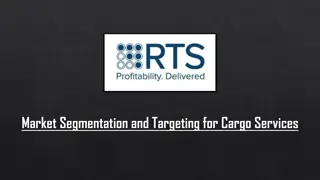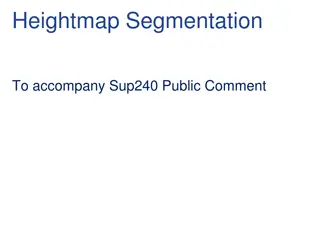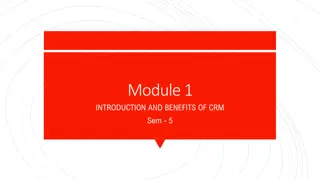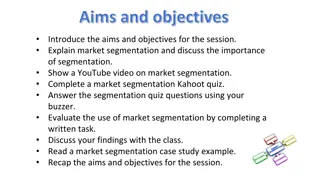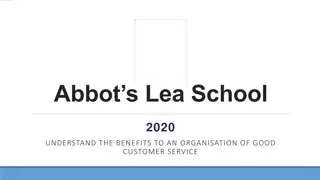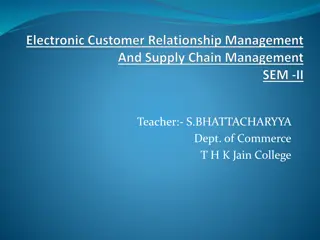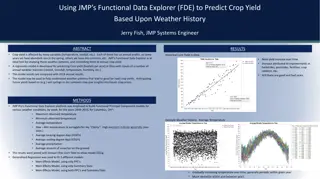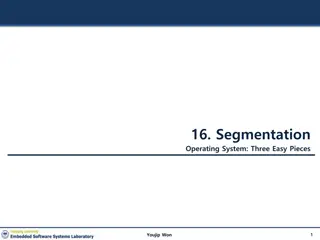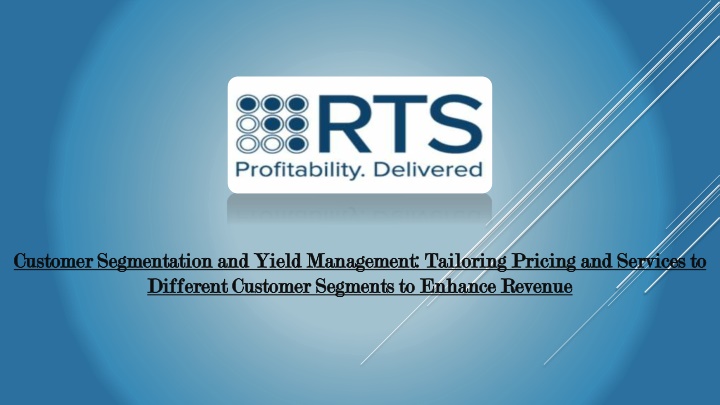
Customer Segmentation and Yield Management
In the competitive world of logistics and transportation, maximizing revenue is not just about increasing sales but also about optimizing how services are offered to different customer segments. Cargo revenue management, which incorporates customer segmentation and yield management, plays a crucial role in achieving this goal. By understanding the distinct needs and behaviors of various customer segments, companies can tailor their pricing strategies and service offerings, thereby enhancing overall revenue and efficiency.n
Download Presentation

Please find below an Image/Link to download the presentation.
The content on the website is provided AS IS for your information and personal use only. It may not be sold, licensed, or shared on other websites without obtaining consent from the author. If you encounter any issues during the download, it is possible that the publisher has removed the file from their server.
You are allowed to download the files provided on this website for personal or commercial use, subject to the condition that they are used lawfully. All files are the property of their respective owners.
The content on the website is provided AS IS for your information and personal use only. It may not be sold, licensed, or shared on other websites without obtaining consent from the author.
E N D
Presentation Transcript
Customer Segmentation and Yield Management: Tailoring Pricing and Services to Customer Segmentation and Yield Management: Tailoring Pricing and Services to Different Customer Segments to Enhance Revenue Different Customer Segments to Enhance Revenue
In the competitive world of logistics and transportation, maximizing revenue is not just about increasing sales but also about optimizing how services are offered to different customer segments. Cargo revenue management, which incorporates customer segmentation and yield management, plays a crucial role in achieving this goal. By understanding the distinct needs and behaviors of various customer segments, companies can tailor their pricing strategies and service offerings, thereby enhancing overall revenue and efficiency.
Understanding Customer Segmentation Understanding Customer Segmentation Customer segmentation involves dividing a broad customer base into smaller groups with similar characteristics, needs, or behaviors. For cargo services, these segments can be defined based on factors such as shipment size, frequency of shipments, types of goods transported, and urgency of delivery. By segmenting customers, companies can gain valuable insights into the preferences and expectations of each group. For instance, a business that frequently ships large volumes of goods might prioritize cost-effective solutions and reliability over speed. Conversely, a customer needing urgent delivery for perishable goods would value speed and specialized handling services. Recognizing these differences allows companies to offer more personalized and effective solutions, thereby increasing customer satisfaction and loyalty. The Role of Yield Management The Role of Yield Management Yield management, also known as revenue management, is the practice of strategically controlling inventory and pricing to maximize revenue. In the context of cargo revenue management, this involves adjusting prices based on demand, capacity, and customer segment characteristics. A key component of yield management is dynamic pricing, where prices fluctuate based on real-time market conditions and demand levels. For example, during peak seasons or periods of high demand, prices may be increased for last-minute shipments to maximize revenue from customers who need urgent delivery. Conversely, during off-peak times, discounts might be offered to attract price-sensitive customers and fill unused capacity.
Integrating Customer Segmentation and Yield Management Integrating Customer Segmentation and Yield Management The integration of customer segmentation and yield management enables companies to adopt a more nuanced approach to pricing and service delivery. By aligning pricing strategies with the specific needs and behaviors of different customer segments, companies can optimize their revenue potential. Consider a logistics provider that has segmented its customers into three categories: high-volume shippers, occasional shippers, and urgent shippers. For high-volume shippers, the company could offer volume-based discounts and flexible contracts that reward loyalty. For occasional shippers, targeted promotions and one-time discounts might be more effective. Urgent shippers could be charged premium rates for expedited services, reflecting the higher value they place on speed and reliability. Enhancing Revenue Through Technology Enhancing Revenue Through Technology Advanced technologies and data analytics are essential for effective customer segmentation and yield management. Tools like predictive analytics and machine learning can analyze vast amounts of data to identify patterns and predict future demand. These insights enable companies to make informed decisions about pricing, capacity allocation, and service customization. Additionally, automated systems can dynamically adjust prices and allocate resources in real-time, ensuring that revenue opportunities are maximized without manual intervention. By leveraging these technologies, companies can respond swiftly to market changes and customer needs, maintaining a competitive edge.
Conclusion Conclusion Incorporating customer segmentation and yield management into cargo revenue management strategies allows logistics companies to enhance their revenue by tailoring pricing and services to meet the unique needs of different customer segments. By understanding and anticipating customer behavior, and by utilizing advanced technologies for dynamic pricing and capacity management, companies can optimize their operations and drive profitability. In a market where customer expectations are continually evolving, this strategic approach is essential for sustained success.
THANK YOU THANK YOU






